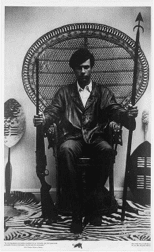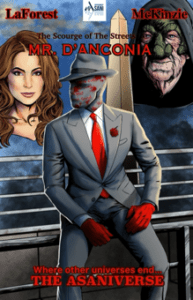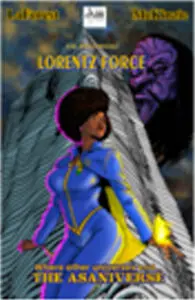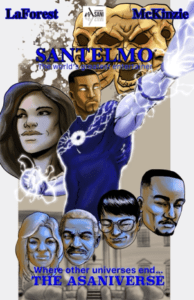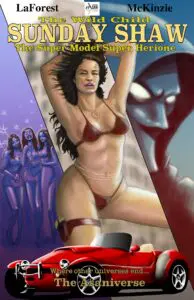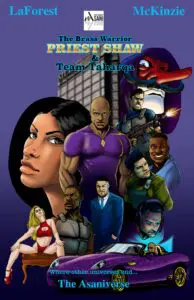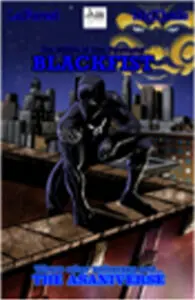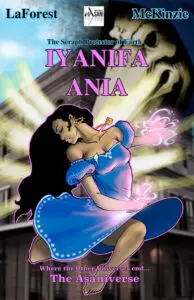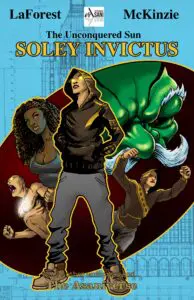The Black Panther Party for Self-Defense
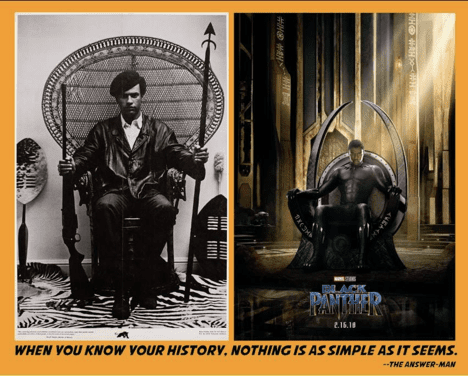
“I do not expect the white media to create positive black male images.”
– Huey P. Newton
Black Panther Party
American organization
Also known as: Black Panther Party for Self-Defense, Panther Party
Black Panther Party, African American revolutionary party, founded in 1966 in Oakland, California, by Huey P. Newton and Bobby Seale. The party’s original purpose was to patrol African American neighborhoods to protect residents from acts of police brutality. The Panthers eventually developed into a Marxist revolutionary group that called for the arming of all African Americans, the exemption of African Americans from the draft and from all sanctions of so-called white America, the release of all African Americans from jail, and the payment of compensation to African Americans for centuries of exploitation by white Americans. At its peak in the late 1960s, Panther membership exceeded 2,000, and the organization operated chapters in several major American cities.
Origin and political program
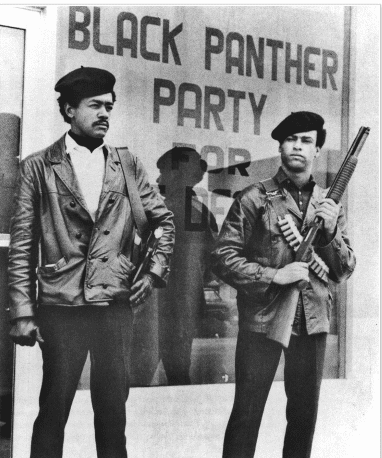
Despite passage of the 1960s civil rights legislation that followed the landmark U.S. Supreme Court ruling in Brown v. Board of Education of Topeka (1954), African Americans living in cities throughout North America continued to suffer economic and social inequality. Poverty and reduced public services characterized these urban centres, where residents were subject to poor living conditions, joblessness, chronic health problems, violence, and limited means to change their circumstances. Such conditions contributed to urban uprisings in the 1960s (such as those in the Watts district of Los Angeles in 1965, among others) and to the increased use of police violence as a measure to impose order on cities throughout North America.
It was in this context, and in the wake of the assassination of Malcolm X in 1965, that Merritt Junior College students Huey P. Newton and Bobby Seale founded the Black Panther Party for Self-Defense on October 15, 1966, in West Oakland (officially “Western Oakland,” a district of the city of Oakland), California. Shortening its name to the Black Panther Party, the organization immediately sought to set itself apart from African American cultural nationalist organizations, such as the Universal Negro Improvement Association and the Nation of Islam, to which it was commonly compared. Although the groups shared certain philosophical positions and tactical features, the Black Panther Party and cultural nationalists differed on a number of basic points.
For instance, whereas African American cultural nationalists generally regarded all white people as oppressors, the Black Panther Party distinguished between racist and nonracist whites and allied themselves with progressive members of the latter group. Also, whereas cultural nationalists generally viewed all African Americans as oppressed, the Black Panther Party believed that African American capitalists and elites could and typically did exploit and oppress others, particularly the African American working class.
Perhaps most importantly, whereas cultural nationalists placed considerable emphasis on symbolic systems, such as language and imagery, as the means to liberate African Americans, the Black Panther Party believed that such systems, though important, are ineffective in bringing about liberation. It considered symbols as woefully inadequate to ameliorate the unjust material conditions, such as joblessness, created by capitalism.
From the outset, the Black Panther Party outlined a Ten Point Program, not unlike those of the Universal Negro Improvement Association and Nation of Islam, to initiate national African American community survival projects and to forge alliances with progressive white radicals and other organizations of people of colour. A number of positions outlined in the Ten Point Program address a principle stance of the Black Panther Party: economic exploitation is at the root of all oppression in the United States and abroad, and the abolition of capitalism is a precondition of social justice.
In the 1960s this socialist economic outlook, informed by a Marxist political philosophy, resonated with other social movements in the United States and in other parts of the world. Therefore, even as the Black Panther Party found allies both within and beyond the borders of North America, the organization also found itself squarely in the crosshairs of the Federal Bureau of Investigation (FBI) and its counterintelligence program, COINTELPRO. In fact, in 1969 FBI director J. Edgar Hoover considered the Black Panther Party the greatest threat to national security.
Impact and repression
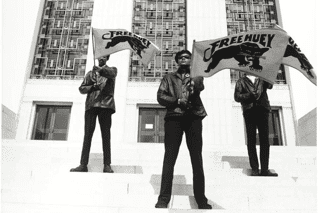
The Black Panther Party came into the national spotlight in May 1967 when a small group of its members, led by its chair, Seale, marched fully armed into the California state legislature in Sacramento. Emboldened by the view that African Americans had a constitutional right to bear arms (based on the Second Amendment of the U.S. Constitution), the Black Panther Party marched on the body as a protest against the pending Mulford Act. The Black Panther Party viewed the legislation, a gun control bill, as a political maneuver to thwart the organization’s effort to combat police brutality in the Oakland community.
The images of gun-toting Black Panthers entering the Capitol were supplemented, later that year, with news of Newton’s arrest after a shoot-out with police in which an officer was killed. With this newfound publicity, the Black Panther Party grew from an Oakland-based organization into an international one with chapters in 48 states in North America and support groups in Japan, China, France, England, Germany, Sweden, Mozambique, South Africa, Zimbabwe, Uruguay, and elsewhere.
In addition to challenging police brutality, the Black Panther Party launched more than 35 Survival Programs and provided community help, such as education, tuberculosis testing, legal aid, transportation assistance, ambulance service, and the manufacture and distribution of free shoes to poor people.
Of particular note was the Free Breakfast for Children Program (begun in January 1969) that spread to every major American city with a Black Panther Party chapter. The federal government had introduced a similar pilot program in 1966 but, arguably in response to the Panthers’ initiative, extended the program and then made it permanent in 1975—undoubtedly to the chagrin of Hoover.
Notwithstanding the social services the Black Panther Party provided, the FBI declared the group a communist organization and an enemy of the U.S. government. Hoover had pledged that 1969 would be the last year of the Black Panther Party and devoted the resources of the FBI, through COINTELPRO, toward that end. In a protracted program against the Black Panther Party, COINTELPRO used agent provocateurs, sabotage, misinformation, and lethal force to eviscerate the national organization.
The FBI’s campaign culminated in December 1969 with a five-hour police shoot-out at the Southern California headquarters of the Black Panther Party and an Illinois state police raid in which Chicago Black Panther leader Fred Hampton was killed. The measures employed by the FBI were so extreme that, years later when they were revealed, the director of the agency publicly apologized for “wrongful uses of power.”
In the early 1970s radical scholar and activist Angela Davis became widely associated with the Black Panthers, though it seems likely that she never actually became a standing member of the party. Davis did, however, have strong connections with the party and taught political education classes for it. She initially gained notoriety in 1970 when then governor of California Ronald Reagan led the Board of Regents in refusing to renew Davis’s appointment as lecturer in philosophy at the University of California, Los Angeles, because of her politics and her association with communists. At about the same time, Davis became involved in the case of three African American inmates at Soledad Prison who had been accused of murdering a guard.
She became deeply involved with one of the inmates, George Jackson, whose younger brother’s attempt on August 7, 1970, to win Jackson’s release by taking hostages in the Marin county courthouse went violently awry. Four deaths resulted, and when at least one of the guns proved to be registered to Davis, she fled charges of conspiracy, kidnapping, and murder, going underground and entering the FBI’s Ten Most Wanted Fugitives list before being captured some eight weeks later after becoming a cause célèbre for the radical Left. Ultimately she was acquitted of all the charges against her by an all-white jury.
From the mid-1970s through the ’80s, the activities of the Black Panther Party all but ceased. Although COINTELPRO contributed to its demise, the dissolution of the party’s leadership also contributed to the downfall of the organization. Kathleen Cleaver earned a law degree and took an appointment as a professor. After returning from exile in Cuba, Newton was killed in a drug dispute in August 1989, perishing in an alley in West Oakland, not far from where he and Seale had founded the first Black Panther Party chapter. Eldridge Cleaver designed clothes in the 1970s and ’80s before joining the anticommunist Unification Church en route to becoming a born-again Christian and a registered member of the Republican Party.
Legacy
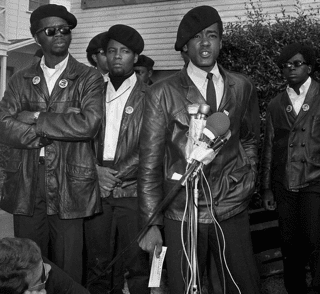
From its founding in 1966, the influence of the Black Panther Party assumed a transnational character that went beyond the creation of support groups for the organization. Activists in Australian urban centers, for example, incorporated the works of Black Panther Party members into their social movements. The oppressed Dalits in India emulated the rhetoric of the Black Panthers, and the representatives of the Vietnamese National Liberation Front, who called themselves Yellow Panthers, also used the organization as a model.
Closer to the United States, the Vanguard Party in the Bahamas closely studied the Black Panther Party, drew on its political philosophy, adopted its use of uniforms and its Ten Point Program, and published the newspaper Vanguard, whose scope and format mirrored the Black Panther Party’s newspaper, Black Panther, to shape its program of activism.
Even decades after the founding of the organization, the Black Panther Party survived in the public imagination in the United States as a result of the publication of a number of memoirs by its members and the use of its rhetoric in rap music. In 1990 Milwaukee Alderman Michael McGee, a former Black Panther Party member, sought to resurrect the organization when he formed the Black Panther Militia in response to the neglect of his community by local politicians and business leaders. The militia inspired other chapters and eventually became the New Black Panther Party, under the leadership of community activist Aaron Michaels.
By 1998, Khallid Abdul Muhammad, the former national spokesperson for the Chicago-based Nation of Islam, had assumed the de facto leadership of the organization when he led a group of shotgun- and rifle-toting New Black Panther Party members to Jasper, Texas, in the wake of the murder of James Byrd, Jr., a 49-year-old African American man who had been dragged behind a pickup truck by three members of the Ku Klux Klan. The New Black Panther Party also became known to the public through the Million Youth March it first organized in New York in 1998.
Many activities of the New Black Panther Party clearly replicated those of the original Black Panther Party. At the same time, however, the New Black Panther Party embraced a staunchly cultural nationalist orientation, leading some former Black Panther Party leaders to denounce it for using the Black Panther Party name and for appropriating its legacy.
The Southern Poverty Law Center also emphasized the difference between the two groups and labeled the New Black Panther Party a racist and anti-Semitic hate group. Members of the New Black Panther Party, however, were unapologetic and summarily rejected such condemnation, contending that they only took up the struggle for social justice and freedom that the original Black Panther Party had failed to sustain.
American Activist
Huey P. Newton (February 17, 1942, Monroe, Louisiana, U.S. — August 22, 1989, Oakland, California)
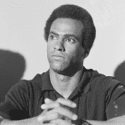
He was an American political activist, cofounder (with Bobby Seale) of the Black Panther Party (originally called Black Panther Party for Self-Defense).
Newton, who graduated from high school without ever having learned to read, taught himself how to read before attending Merritt College in Oakland and the San Francisco School of Law. While at Merritt he met Seale. In Oakland in 1966 they formed the Black Panther group in response to incidents of alleged police brutality and racism and as an illustration of the need for Black self-reliance. At the height of its popularity during the late 1960s, the party had 2,000 members in chapters in several cities.
In 1967 Newton was convicted of voluntary manslaughter in the death of a police officer. His imprisonment sparked protests—and the popular rallying cry “Free Huey.” His conviction was overturned in 1970, and he was released from prison. In 1971 he announced that the party would adopt a nonviolent manifesto and dedicate itself to providing social services to the Black community, which included free meals for children and health clinics. In 1974 Newton was accused of another murder and fled to Cuba for three years before returning to face charges; two trials resulted in hung juries.
Newton received a Ph.D. in social philosophy from the University of California at Santa Cruz (1980); his dissertation, “War Against the Panthers,” was subtitled “A Study of Repression in America.” Succumbing to factionalism and pressure from government agencies, the Black Panther Party disbanded in 1982. In March 1989 Newton was sentenced to a six-month jail term for misappropriating public funds intended for a Panther-founded Oakland school. In August of that year he was found shot dead during a drug dispute in Oakland.
American Activist
Bobby Seale (October 22, 1936, Dallas, Texas, U.S.)
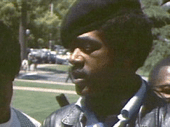
is an American political activist who founded, along with Huey P. Newton, the Black Panther Party; Seale also served as the national chairman. He was one of a generation of young African American radicals who broke away from the traditionally nonviolent civil rights movement to preach a doctrine of militant Black empowerment. Following the dismissal preach a doctrine of militant Black empowerment. Following the dismissal of murder charges against him in 1971, Seale somewhat moderated his more militant views and devoted his time to effecting change from within the system.
Seale grew up in Dallas and in California. Following service in the U.S. Air Force, he entered Merritt College, in Oakland, California. There his radicalism took root in 1962, when he first heard Malcolm X speak. Seale helped found the Black Panthers in 1966. Noted for their violent views, they also ran medical clinics and served free breakfasts to schoolchildren, among other programs.
In 1969 Seale was indicted in Chicago for conspiracy to incite riots during the Democratic national convention the previous year. The court refused to allow him to have his choice of lawyer. When Seale repeatedly rose to insist that he was being denied his constitutional right to counsel, the judge ordered him bound and gagged. He was convicted of 16 counts of contempt and sentenced to four years in prison. (See Chicago Seven.) In 1970–71 he and a codefendant were tried for the 1969 murder of a Black Panther suspected of being a police informer. The six-month-long trial ended with a hung jury.
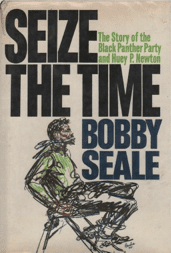
Following his release from prison, Seale renounced violence as a means to an end and announced his intention to work within the political process. He ran for mayor of Oakland in 1973, finishing second. As the Black Panther Party faded from public view, Seale took on a quieter role, working to improve social services in Black neighbourhoods and to improve the environment. His books included the autobiography A Lonely Rage (1978), Seize the Time: The Story of the Black Panther Party and Huey P. Newton (1970), and Power to the People: The World of the Black Panthers (2016; cowritten with Stephen Shames). Seale also published Barbeque’n with Bobby (1988), a cookbook.
